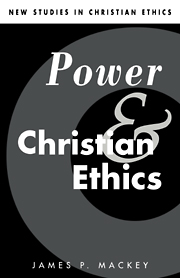Book contents
General editor's preface
Published online by Cambridge University Press: 05 November 2011
Summary
This is the third monograph to appear in the New Studies in Christian Ethics series. It fits very well the interdisciplinary nature of the series, and is written by one of the most significant theologians in Britain today.
The theme of power has been a sub-text of Professor James Mackey's writings for more than a decade. It is present in the early chapters of his major study The Christian Experience of God as Trinity. It is more prominent in his Modern Theology and indeed in his innovative and most recent work in Celtic theology. He is a philosopher by training and background, but through the influence of writers such as Alasdair MacIntyre he has also read deeply in the social sciences. His range of scholarship is broad, but he always brings to his writings insights that are clearly his own. Sharp observations – sometimes eirenic, but more often polemical – appear on almost every page of his writings.
For James Mackey power is to be located on a spectrum between force and authority. On moral grounds power exercised as authority is usually to be preferred to power exercised as force, since the latter tends to eliminate the possibility of genuinely moral behaviour. At most, power exercised as force should be used to protect the perimeters of the area within which moral agents are to act.
- Type
- Chapter
- Information
- Power and Christian Ethics , pp. ix - xPublisher: Cambridge University PressPrint publication year: 1994

